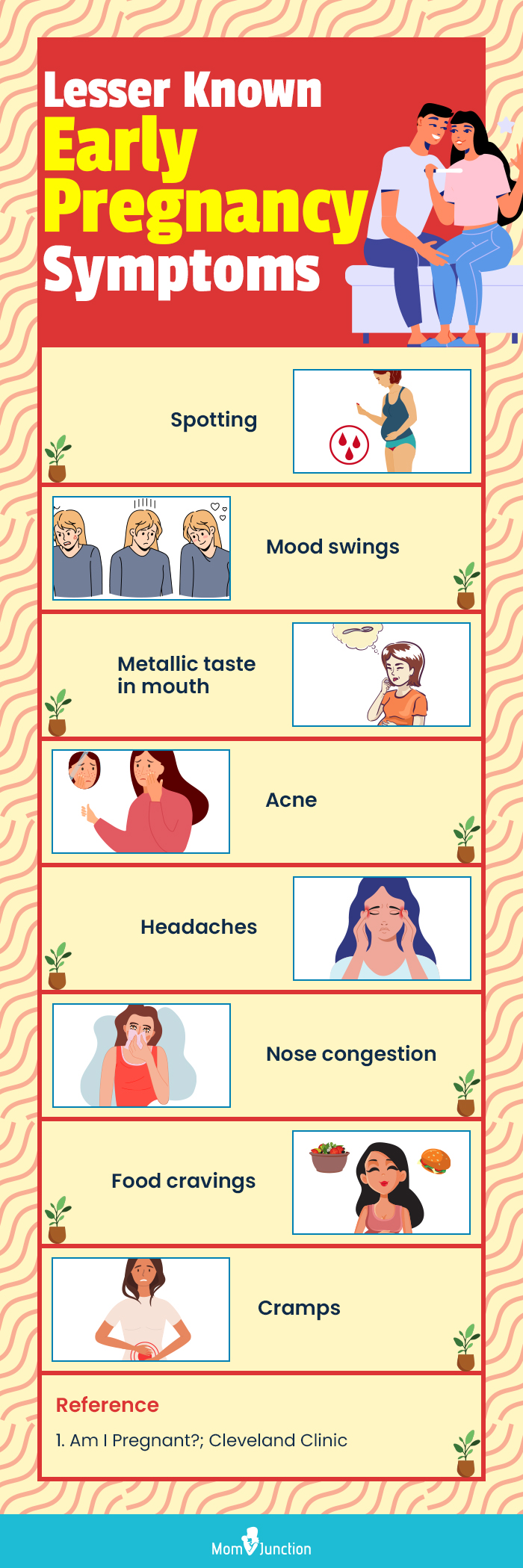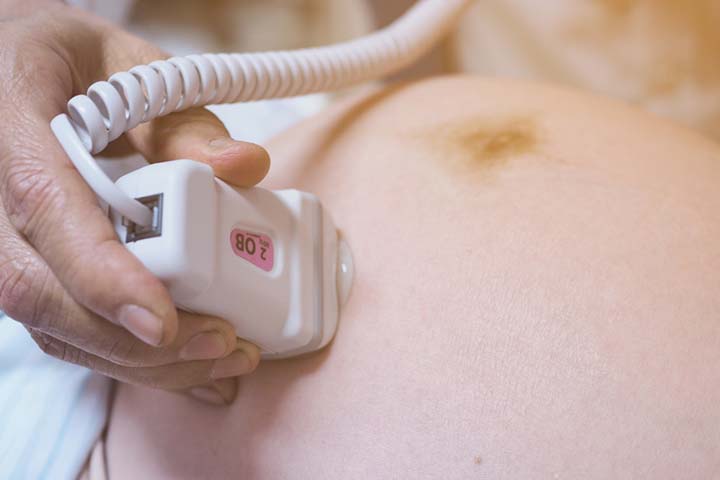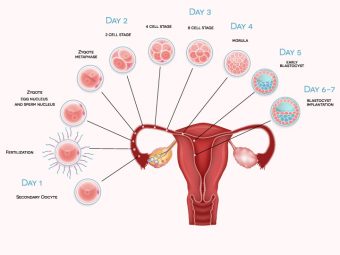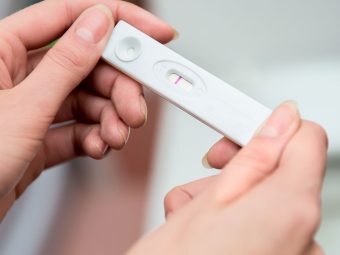
Image: iStock
Not all women respond similarly to being pregnant. While some are ecstatic about experiencing early pregnancy signs, for others, the lack of pregnancy symptoms could be bothersome. If you are the latter one, you may be holding on to a regular pregnancy test to reassure yourself. Though uncommon, most women may not experience any symptoms in the initial weeks of pregnancy. If you have just learned about your pregnancy and are in four to five weeks of gestation, it is too early to experience the pregnancy signs. Most women develop symptoms at around the six weeks of pregnancy (1). However, if you haven’t felt the signs of being pregnant by week six, it could leave you anxious and worried about the baby’s growth inside you. Read on as we discuss all the vital details about being pregnant with no signs, possible reasons, and ways to deal with this phase.
Why Some Women Don’t Experience Pregnancy?
All women are different. For the same person, the subsequent pregnancies may be different from the first one. And different women experience pregnancy differently. Some pregnancies are textbook perfect. Morning sickness? Check. Food aversion? Check. Women with such pregnancies experience all the expected symptoms.
But here’s the thing. You may be experiencing symptoms you didn’t even know came with pregnancy! These ‘offbeat’ symptoms are rare but normal. Increased energy, jacked-up sex drive, and a gigantic appetite are all such rare symptoms that you may be feeling.
Image: Shutterstock1q
Hormones behave differently in different bodies. So, the reason for all your positive symptoms is just plain luck! Another reason you may experience pregnancy symptoms late is if you smoke (2).
And why would you want to experience morning sickness? Yes, some studies say that morning sickness is nature’s way of protecting you and your child from foodborne illnesses. (3) But today we know what to eat and what to avoid during pregnancy. Maybe evolution will catch up soon and stop punishing pregnant women with morning sickness!
 Did you know?
Did you know?What Can You Do?
If you really want to experience pregnancy symptoms, wait for a week or two. Sooner or later, some of the pregnancy symptoms will kick in. In the meantime, you can go to your doctor and ask for an ultrasound scan to put your mind at ease.
If you are at 9-10 weeks of pregnancy, you can even get a Doppler and try finding your baby’s heartbeat. But this is a risky option. It takes an expert to use the Doppler. And if you use it wrong, you may be unable to locate the tiny beat. That is sure to panic you! But many women use the Doppler and manage to get some peace of mind. This is especially true for women who have suffered from infertility or miscarriages.
Image: Shutterstock
And just because you are not ‘feeling’ pregnant, doesn’t mean you are not. At no point should you stop taking your prenatal vitamins.
 Quick fact
Quick factThe Honeymoon Period
There is another set of women out there who experience all the pregnancy symptoms there are in the first few weeks. But then the second trimester arrives. Suddenly, all the pregnancy symptoms vanish. This is because your body settles down into the pregnancy, and the hormones find a rhythm by the end of the first trimester (12 weeks).
Don’t worry! The morning sickness may be gone, but other symptoms are round the corner. So enjoy this honeymoon period for as long as you can!
In a few weeks, your body will become heavier. Your pregnancy will become apparent as you begin to ‘show’. And you’ll feel your baby move. Till then, soak in the ‘symptom-less’ days!
When To See Your Doctor?
Image: IStock
If something is wrong with the pregnancy, you’ll experience some specific symptoms. If you notice any of the following signs, consult your doctor (4):
- Blurred vision
- A hot, painful, or swollen area on your calf
- High fever that lasts more than 24 hours
- Sudden severe or continuous pain or cramping in the lower abdomen
- Vaginal bleeding or spotting
- Severe headaches
- Absence of baby movement for two hours of mindful observance (after the second haft of pregnancy)
- Diarrhea, nausea, or vomiting lasting longer than 24 hours.
Frequently Asked Questions
1. Does lack of pregnancy symptoms mean miscarriage?
Not always, but some women might have a pregnancy loss without experiencing any symptoms (5). Moreover, some women may experience a sudden loss of pregnancy symptoms, such as nausea and vomiting (which they experienced earlier). At times, it may be a sign of miscarriage (6).
2. Can I be pregnant without sore nipples?
While most women may notice changes in their breasts in early pregnancy, some women may not experience any, as pregnancy symptoms may vary greatly from person to person (7).
Lack of pregnancy symptoms is not common, though not impossible. Some women may not show any pregnancy symptoms like others and continue a healthy pregnancy. The absence of pregnancy symptoms is not a concern if your doctor assures the baby’s health and pregnancy hormones levels are normal. Some pregnant women may not have symptoms in the earlier weeks and later develop symptoms. While a few may not have any symptoms even in the later trimesters other than the growing belly. Home urine pregnancy tests and blood tests, and ultrasound imaging are ways to confirm healthy pregnancy since the onset of pregnancy symptoms may vary in each woman.
Infographic: Less Common Signs Of Early Pregnancy
Each pregnancy symptom is different, and every woman experiences them at different times. So do you want to know the not-so-common signs of early pregnancy? In the infographic below, we walk you through some less common pregnancy symptoms. Check out! Illustration: Momjunction Design Team
Get high-quality PDF version by clicking below.
Download Infographic
Key Pointers
- It’s common for some women not to have pregnancy symptoms during the early weeks of pregnancy.
- Hormones can work differently in various bodies, resulting in unique and strange symptoms.
- Prenatal vitamins should not be stopped by women who don’t experience pregnancy symptoms.
- Immediately seek medical advice from her doctor if you experience sudden severe pain or vaginal bleeding.
References:
- Normal Pregnancy Symptoms: Here’s What to Expect.
https://utswmed.org/medblog/normal-pregnancy-symptoms/ - Amy E Sayle et. al.; (2002); A prospective study of the onset of symptoms of pregnancy.
https://pubmed.ncbi.nlm.nih.gov/12160915/ - Morning sickness is Mother Nature’s way of protecting mothers and their unborn, Cornell biologists find.
https://news.cornell.edu/stories/2000/05/morning-sickness-protects-mothers-and-their-unborn - Pregnancy – signs and symptoms.
https://www.betterhealth.vic.gov.au/health/healthyliving/pregnancy-signs-and-symptoms - What are the symptoms of pregnancy loss (before 20 weeks of pregnancy)?
https://www.nichd.nih.gov/health/topics/pregnancyloss/conditioninfo/symptoms# - Miscarriage: the signs and what really happens
https://www.nct.org.uk/pregnancy/miscarriage/miscarriage-signs-and-what-really-happens#:~:text=If%20pregnancy%20symptoms%20go%20away - Signs and symptoms of pregnancy.
https://www.nhs.uk/pregnancy/trying-for-a-baby/signs-and-symptoms-of-pregnancy/




















